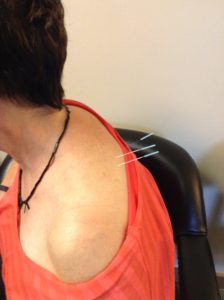A few weeks ago, I was catching up with an out-of-town friend who was visiting Minneapolis for a long weekend. We got to talking about her health, and she told me about an exciting new therapy that she had undergone recently. It was called dry needling, and it was being performed on her by a physical therapist.
I began to tell her that dry needling was nothing more than acupuncture needles placed into various points (muscle trigger points, actually), and usually performed by someone who was not adequately trained. She would hear none of it, and explained that this particular person was certified and had taken all the training necessary to be needling clients.
Our conversation was interrupted, as happens at social gatherings. The next day, however, I did some checking online for dry needling certification programs for physical therapists. I was curious. As disturbed as I was after talking with my friend, after checking dry needling training courses online, I was pretty freaked out. Here’s why:
Your physical therapist can begin needling you–deeply–after one weekend of training. That’s right, after a little home study, and a three-day course, or about 27 hours, they’re able to begin using what (little) they’ve learned on patients in the clinic. Does that scare you? It should.
I know this may sound a little like sour grapes coming from an acupuncturist. However, there’s much more to it than that. Health care consumers (that’s all of us, folks) should be aware of this. My friend was convinced that her physical therapist was adequately trained because he has some kind of “certification” in dry needling. A certification can mean anything you want it to. It simply means you passed, or merely attended, some kind of training for an undetermined amount of time.
My greatest concern is the issue of safety. Absolutely nobody should be needling patients after only one weekend of training. The possibility of punctured organs, nerve damage, and punctured blood vessels is very real, especially if those people needling have only been doing so since last Friday. Furthermore, there is a risk of infection inherent with needling.
Licensed acupuncturists receive their license to practice after 2,000 to 3,000 hours of study, 600 of which are in the clinic; a master’s or PhD degree; and passing a rigorous national examination. They are licensed by their state Board of Medical Examiners. They spend many hours studying the exact location and depth of each acupuncture point, along with clean needling techniques. In the clinic, they bring their years of study and experience in Chinese medicine into the diagnosis and treatment of each patient.
So who would you rather have putting needles into you–someone with 27 hours of study over a three-day weekend or a Licensed acupuncturist?
For more on this issue, check out The TCM Directory.





